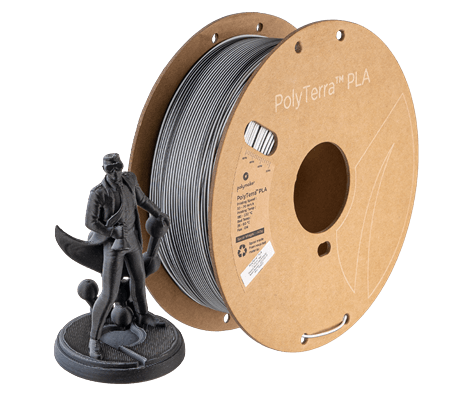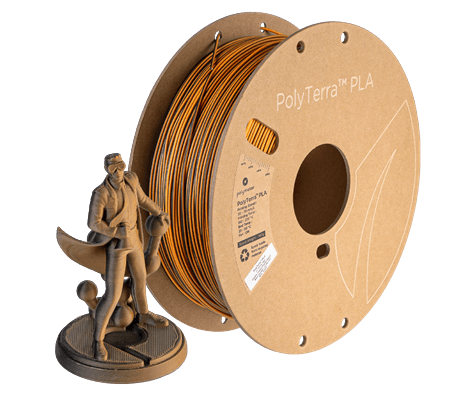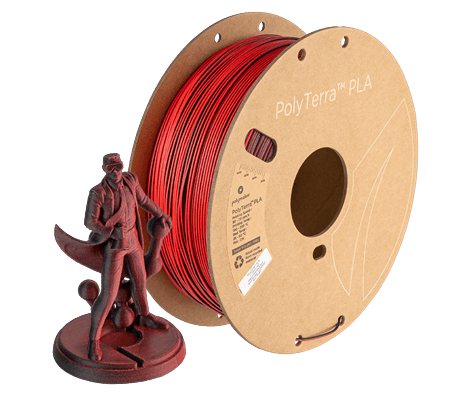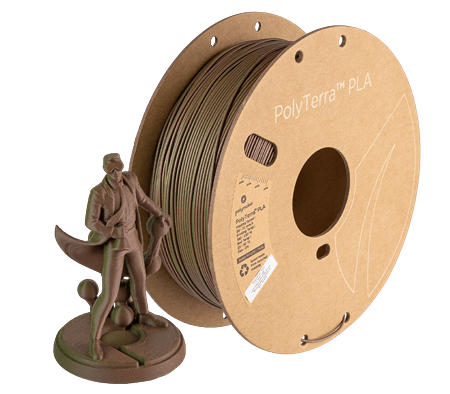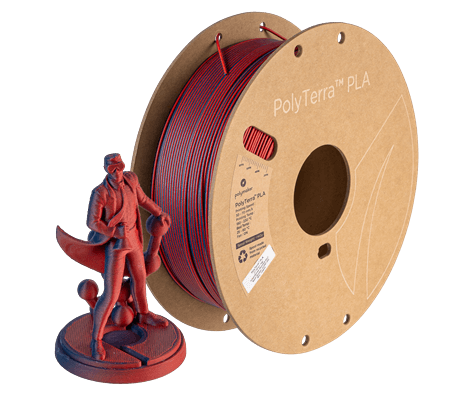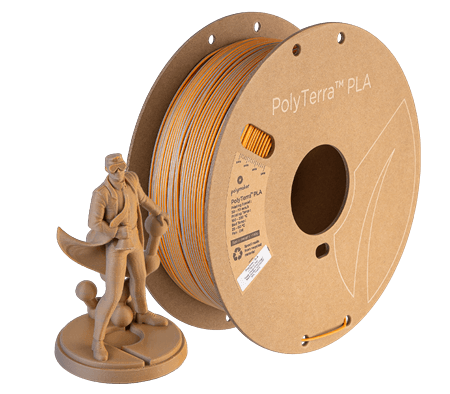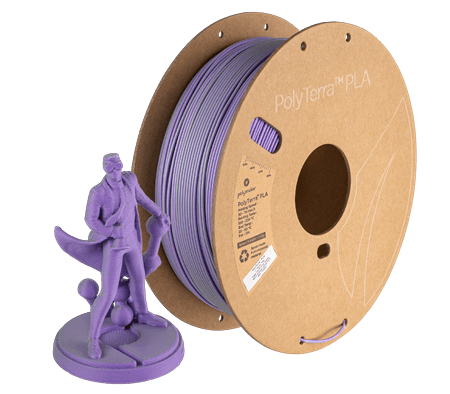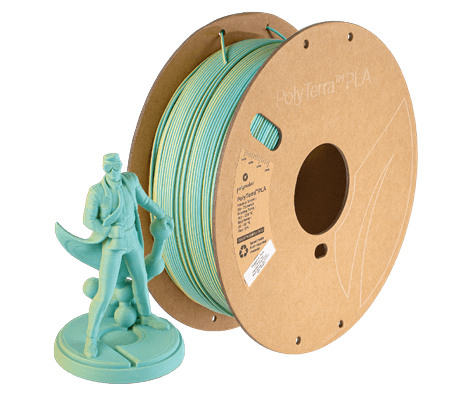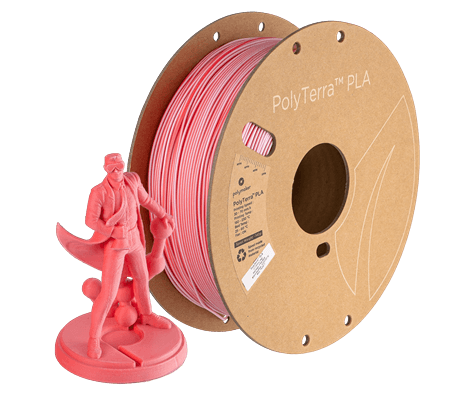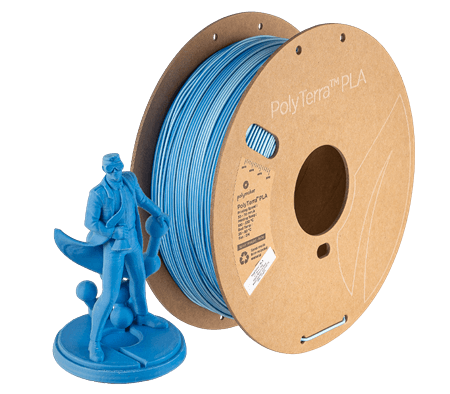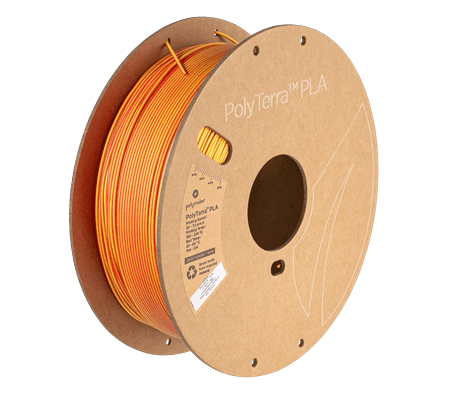Same Day Dispatch
Description
PolyTerra™ Matte Dual PLA delivers a smooth matte surface finish with a dynamic colour transition effect. Manufactured with Polymakers Jam-free™ technology.
- Matte dichromatic / dual colour filament.
- Sustainable sourced Polymaker Matte PLA formula
- Smooth matte surface finish.
- Optimised for easier support removal.
- High speed capable on suitable hardware.
- Excellent printer compatibility.
- Consistent colour and tolerance (1.75mm diameter +/- 0.03mm)

PolyTerra™ PLA Dual is a dichromatic matte PLA 3D printing filament that is manufactured with two different colours to give models a striking dual-coloured effect. Based on Polymakers PolyTerra™ Matte formula, this bioplastic filament is sourced naturally to provide ease of use, printing quality, speed and reliability. It is the perfect choice for creating colourful models with a smooth matte surface finish that hides the layers.
Features
- Dichromatic Matte Finish - PolyTerra™ Dual PLA is a high quality dual colour matte filament that offers a beautiful and dynamic colour transition effect for your 3D prints[1] delivering a fun multi-colour filament for hobbyists, educators and small businesses. Print parts with a beautiful matte surface finish and unleash your imagination with Polymakers fun and vibrant dual colour range.
- Optimized for Support - PolyTerra™ Dual PLA has been engineered with excellent support removal properties, enabling users to more easily break away support or rafts from the surface of their prints.
- High Speed Capable - Polymaker have engineered the base PolyTerra™ PLA formula with ideal flow properties to deliver a filament which is capable of high speed printing (only on suitable hardware).
- Bioplastic Matte PLA Formula - PolyTerra™ Dual PLA is based on a newly developed material from Polymaker called FBC (Fully Bio Compound). It is a compound of high quality Ingeo PLA compounded with naturally occurring elements. The result is a PLA filament with less plastic content that feels softer and more ductile / less brittle on the spool. Polymakers FBC formula contains less PLA plastic to degrade which improves the speed of degradation under specific industrial conditions. Like other PLA's, the degradation rate is still very slow in ambient temperatures.
- Ductility (X-Y) - PolyTerra™ Dual PLA is softer than regular PLA, delivering improved ductility in the horizontal X-Y axis than standard PLA formulations. Whereas a test bar in standard PLA will snap when bent, PolyTerra™ Dual PLA will tend to gradually bend and fracture in the horizontal axis.
- Compatibility / Jam-Free™- PolyTerra™ Dual PLA is compatible with a wide range of 3D printers and is manufactured with Polymakers Jam-Free™ technology which leads to excellent printing quality with zero risk of nozzle jams caused by heat creep [2]. PolyTerra™ Dual PLA works well on most printing surface with a thin layer of glue stick applied, no heated bed is required but can sometimes be used at 40 - 50°C for better results (maximum 60°C).
- Uncompromised Quality - PolyTerra™ Dual PLA filament is made with the highest quality ingredients including Ingeo® from Natureworks; a high quality PLA material produced from rapidly renewable plant resources in the US. Combining Polymakers innovative R&D technologies, compounding and extrusion systems with Natureworks Ingeo® resins produces a reliable 3D printing filament to print beautiful and accurate models.
[1] See "Settings & specifications" for printing advice and to learn about achieving the smoothest dual colour effect.
[2] Heat creep is the the process of heat spreading irregularly throughout the hot end, one common example is with all metal hot end designs. Once heat creeps towards the cold end, the PLA filament softens prematurely in the cold end and expands resulting in a jam. Polymakers Jam-Free™ technology increases the heat resistance of the filament itself (not the printed part) to 100˚C which prevents the filament from prematurely softening in the cold end and can still melt rapidly once entering the heating zone.
Printing Settings
| Nozzle Temperature | 190°C - 230°C |
|---|---|
| Build Plate Temperature | 25°C - 60°C* *You may find lower bed temperatures (i.e 45°C) work better with PolyTerra™ PLA in comparison to higher temperatures. |
| Build Surface Material | Compatible with most common build surfaces. |
| Build Surface Treatment | Apply a thin layer of PVA or PVP glue stick. |
| Cooling Fan | ON |
| Printing Speed | 30 mm/s - 70 mm/s |
| Retraction | The ideal retraction settings vary from printer to printer. If you find the retraction settings are causing gaps in your part, the following settings may help. Direct Drive: Retraction distance of 0.5 - 1mm with retraction speed of 20mm/s Bowden: Retraction distance of 2 - 3mm with retraction speed of 20 - 40mm/s |
| Recommended Support Material | Single Extrusion: Self Support Dual Extrusion: PolyDissolve™ S1 (Dissolve in tap water) PolySupport™ (Easy break-away support material) |
Based on 0.4 mm nozzle. Printing conditions may vary with different printers and nozzle diameters.
To produce flatter more dimensionally accurate parts, PolyTerra™ PLA may work best on your printer with lower bed temperatures (i.e 45 - 50°C) compared to higher temperatures (i.e 55 - 60°C +) .
Tips for printing dichromatic filament
1. Dichromatic / dual colour filaments print the best when the outside perimeters of the part are all printed in the same direction for each layer, not all slicers do this by default. You can view the direction of the tool path in slicer preview.
2. PolyTerra Dual PLA is wound carefully to ensure correct colour alignment on the spool. To achieve the best result, make sure the filament doesn't twist in the feeding path. If the filament twists during printing, the position of the two colours will shift throughout the print resulting in a striping effect. Some users find this effect desirable while others don't. Some level of twisting is common with most 3D printers on the market but excessive twisting may be more likely with some printers depending on their spool mount, hot end and extruder design. Using a high quality dual geared direct drive extruder and mounting the spool in a straight position that avoids twisting can help reduce this striping effect.
3. Smaller melt zones are better for dichromatic / dual colour filaments. This effect works because our 3D printers print with a laminar flow and so the two colours don't mix. Volcano-style hotends or CHT-style nozzles can produce mixing that reduces the dual-colour visual effect.
4. It can be useful to print an alignment coin to tell you exactly where the colour change will occur. The angle will be different for every printer setup, but we have found that if the printer and spool stay in the same orientation, the alignment doesn't change from spool to spool.
Specification
| Net Weight | 1kg |
|---|---|
| Material Type | Matte PLA (Fully Bio Compound) |
| Density | 1.31 g/cm3 |
| Colour |
Compatibility
PolyTerra™ PLA has been engineered with compatibility in mind to print excellently on a wide range of 3D printers. The Jam-Free™ technology implemented into PolyTerra™ PLA can improve compatibility with all metal hot end designs that suffer from heat creep.
Of course with thousands of unique 3d printer models on the market, we can't guarantee each filament type will work with every 3D printer. Slicer experience and setting adjustment is always required to get the most out of a material. Before jumping into an ambitious project we always recommend printing some known calibration tests to build or make adjustments to the filament profile.
Technical Data
All testing specimens were printed under the following conditions: Nozzle Temperature = 200˚C, build plate temperature = 60˚C, infil = 100%, cooling fan = ON
All specimens were conditioned at room temperature for 24h prior to testing.
THERMAL PROPERTIES
| Value | Testing Method | |
| Glass Transition | 60.6°C | DSC, 10°C/min |
| Heat Deflection Temperature |
0.45 Mpa - 57.8°C HDT Curve |
ISO 75 0.45MPa |
| Vicat Softening Temperature | 62.7°C | ISO 306, GB/T 1633 |
MECHANICAL PROPERTIES
| Value | Testing Method | |
| Youngs Modulus (X-Y) |
1882 ± 141 MPa | ISO 527, GB/T 1040 |
| Tensile Strength (X-Y) |
20.9 ± 2.0 MPa | ISO 527, GB/T 1040 |
| Bending Strength (X-Y) |
39.6 ± 1.1 MPa | ISO 178, GB/T 9341 |
| Charpy Impact Strength (X-Y) |
5.7 ± 0.4 kJ/m2 | ISO 179, GB/T 9343 |
We have full MDS and technical data sheets for PolyTerra™ PLA and all other Polymaker products. Contact us to enquire!
The typical values presented in Polymakers data sheet are intended for reference and comparison purposes only. Due to the nature of 3D printing they should not be used for design specifications or quality control purposes.
STORAGE & DRYING
All plastics are hygroscopic meaning they absorb moisture from the air which can affect printing quality and strength of printed parts. How quickly this absorption occurs depends on the material and your environment. Polymakers PolyTerra™ PLA filaments are dried and packaged in a vacuum sealed bag with desiccant to ensure the best printing quality. When not in use PolyTerra™ PLA should be stored away from sunlight and sealed in the packaged resealable bag.
Although filaments can be dried, drying will speed up the aging process of the plastic making it more brittle over time. Preventing the filament from absorbing moisture in the first place is the best solution to keep your filament working to its maximum potential. For long term storage we highly recommend storing in a sealed container with dry desiccant that reduces the relative humidity to 10-20% RH.
In-house we manage our filaments with Polymakers PolyDryer™ which keep offers best-in-class sealing to protect filaments from absorbing moisture
If you hear popping sounds and notice that the surface quality of your print is uneven or the colour is not consistent, this is a likely indicator that the filament has absorbed too much moisture. Spools of PolyTerra™ PLA can be dried with Polymaker PolyDryer™ using power level 1. Alternatively if you have a convection oven that is accurate at low temperatures, users can dry filament in a preheated convection oven at 55˚C for up to 6 hours. Results may vary depending on the accuracy of your oven so please be conservative. For more information about filament drying please read our user guide.
FAQ
Q: Does Jam-Free™ technology prevent all filament jamming?
A: Jam-Free™ technology is designed to prevent jamming caused by heat creep. There are many reasons why a material may jam, such as printing with the wrong extruder temperature or incorrect nozzle height; Polymaker's Jam-Free™ technology won't prevent jamming in these cases.
Q: Is PolyTerra™️ PLA food safe?
A: Polymaker's PolyTerra™️ PLA is compliance with RoHS Directives 2011/65/EU and (EU) 2015/863 and REACH regulation, which means it does not contain toxic or harmful substance listed. However due to the nature of FDM 3D printing, the printed PolyTerra™️ PLA parts might have micro-cracks and holes which are invisible to the naked eye even though the prints look smooth. Bacteria are prone to grow in these micro-cracks and holes and thus we do not recommend to use the 3D printed parts in food contact applications.
Q: How long does it take for PolyTerra™️ PLA to degrade?
A: PolyTerra™️ PLA degrades under the specific conditions of industrial composting, namely, at certain temperature and humidity with the presence of micro-organisms. The degrade rate will depend on the size and thickness of the printed part. Polymaker has run a compostability test, certified to ISO 14855-1, with a third party laboratory that revealed PolyTerra™️ PLA degraded faster than a comparable PLA material. The test was completed by putting small pellets of PolyTerra™️ PLA in a 2-4 months old plant compost (including a wide variety of microorganisms) and heating up the system up to 60˚C. During this process the PolyTerra™️ PLA will start to decompose into carbon dioxide, water and mineral salts and the aforementioned elements are monitored in order to calculate the mass of PolyTerra™️ PLA degraded. After 45days, 93.6% of PolyTerra™️ PLA degraded and from Polymakers estimation it could take less than 100 days for PolyTerra™️ PLA to fully degrade. Polymaker ran the exact same test with their PolyLite™️ PLA which is a pure regular PLA and, after 45days, 79.9% of it degraded. Which means PolyTerra™️ PLA degrades up to 15% faster than regular PLA.
Q: What support materials can I use with this product?
A: PolyTerra™ PLA has been engineered with excellent support removal properties, enabling users to more easily break away support or rafts printed in PolyTerra™ PLA. Polymaker’s PolyDissolve™ S1 or PolySupport™ filament are the recommended support filaments for PolyTerra™ PLA if your machine is capable of multi-material printing. If your 3D printer is not equipped for multi-material, self-support can be used.
Q: Should I rewind this filament if I want to use it with a different spool?
A: We strongly advise against tampering with the product by rewinding. See our article for full details about the risks. All Polymaker filaments are wound with tension but without strain. Rewinding completely rearranges the curvature of the winding and this strain over time can cause most plastics to catastrophically break. If for some reason your printer is locked into fitting less than standard sized spools, there may be safe printable adaptors or external mounting solutions available.
Don't know where to start? Or which filament will suit your application? We have a broad range of support options including telephone support. Contact us today!
| Filament | |
| Diameter | 1.75mm |
| Spool Weight | 1kg |
Applications
With a cost-effective price and extensive colour range, PolyTerra™ PLA has quickly become one of our best selling PLA filaments; especially among hobbyists and educators who enjoy printing PLA but are looking for a more sustainably sourced Matte PLA formulation. The combination of Polymakers FBC formula and fully recycled cardboard packaging aim to help offer a more sustainable product and reduce on consumption of single use plastic waste.
Offering a new type of PLA filament, PolyTerra™ PLA is a popular choice for printing:
- Trinkets and figurines.
- Homewares and desk organizers.
- Custom fashion accessories.
- Replica props and display pieces.
- Low cost cosplay pieces.
- Medium - large tabletop buildings and scenery.
- Various models which would typically be difficult to remove support from. (Not ideal for particularly thin or delicate features which could be broken during support removal)
- Architectural models and educational models.
PolyTerra™ PLA has also seen adoption beyond the education and consumer market as a more sustainable alternative for various concept, design and prototyping applications. As we become more aware and considerate of our own consumption habits, many small businesses are looking for ways they can become more ethical and improve the sustainability of their products. While the end 3D printed product is inevitably plastic, PolyTerra™ PLA reduces plastic consumption with Polymakers FBC formula, cardboard spool and a step forward towards sustainable packaging.
Compared to regular PLA materials, PolyTerra™ PLA filament is softer, less brittle and more ductile. Ductility describes how a material breaks, if you flex the filament in your hands a ductile material is more likely to bend gradually in comparison to a brittle material which will suddenly snap. Although PolyTerra™ PLA isn't intended as a high strength material, its ductility is noticeable on printed parts in the horizontal axis which can offer advantages for quite a few end-use applications.
In comparison with PLA and PLA+ materials like PolyLite™ PLA and PolyLite™ PLA Pro; PolyTerra™ PLA exhibits better support removal properties, enabling users to more easily break away support or rafts from the surface of their prints. Combined with great compatibility with sanding and painting, PolyTerra™ PLA has become a popular choice for printing relatively large scale table top models and cosplay pieces. This easy break away of supports correlates with lower inter-layer strength in the z-axis, so additional care may be required when handling thin or delicate features which have been printed vertically. If both sustainability of Polymakers FBC formula and strength are more important than support removal, we recommend considering PolyTerra PLA+ which is a strength optimised version of Polymakers FBC formula, prioritised for layer-adhesion over support removal.
For applications which require a PLA with particularly high mechanical properties, we recommend comparing PolyLite™ PLA (PLA), PolyLite™ PLA Pro (PLA+) which both offer higher tensile strength, rigidity and inter-layer adhesion than PolyTerra™ PLA or PolyTerra™ PLA+. If a multi-material printer is available, comparable support removal process to PolyTerra™ PLA can be achieved by printing these PolyLite™ PLA and PLA Pro materials with a dedicated support material such as PolySupport™ which has been designed to be easily removed.
• Orders ship out of Townsville, QLD, Australia at 1530.
• Active on Instagram - Tag us or DM us!
• Watch what we are up to on our YouTube Channel!
• Join our Facebook Page for updates and RSFPV news.
• GST Registered.
• Gifts with every order!
• Veteran Owned and Operated
• Defence and Service discounts - Apply Here
• 3D Printing and Custom design – Inquire Here.
• Visit us at our Store and have a yarn.
• Sponsor of Townsville FPVR, Next Level FPV
and the Australian Army Drone Racing Team.
• FPV Drone service, support and repairs.
• Earn points for every $1 spent.
• Buy now and pay later with Zippay, Afterpay, Humm and Laybuy.

